All India Anna Dravida Munnetra Kazhagam
The All India Anna Dravida Munnetra Kazhagam (transl. All India Anna Dravidian Progressive Federation; abbr. AIADMK) is an Indian regional political party with great influence in the state of Tamil Nadu and union territory of Puducherry. It is a Dravidian party founded by the former chief minister of Tamil Nadu M. G. Ramachandran (M.G.R.) at Madurai on 17 October 1972 as a breakaway faction from the Dravida Munnetra Kazhagam after M. Karunanidhi expelled him from the party for demanding an account as the party treasurer.[6] The party is adhering to the socio-democratic and social justice principles based on C. N. Annadurai (Anna) collectively coined as Annaism by M.G.R.[7][8] The party has won a seven-time majority in the Tamil Nadu Legislative Assembly, has emerged as the most successful political outfit in the state's history. It is currently the main opposition party in the Tamil Nadu Legislative Assembly and part of the India-ruling National Democratic Alliance.[9]
All India Anna Dravida Munnetra Kazhagam | |
|---|---|
 | |
| Abbreviation | AIADMK |
| General Secretary | Edappadi K. Palaniswami (Interim) |
| Parliamentary Chairperson | M. Thambidurai |
| Rajya Sabha leader | M. Thambidurai |
| Treasurer | Dindigul C. Srinivasan |
| Founder | M. G. Ramachandran |
| Founded | 17 October 1972 |
| Split from | Dravida Munnetra Kazhagam |
| Headquarters | Puratchi Thalaivar M.G.R. Maaligai, 226, Avvai Shanmugam Salai, Royapettah, Chennai – 600014, Tamil Nadu, India. |
| Newspaper | Namadhu Puratchi Thalaivi Amma (Daily journal)[1] News J (Television channel)[2] |
| Student wing | AIADMK Student Wing |
| Youth wing | M.G.R. Youth Wing |
| Women's wing | AIADMK Women's Wing |
| Labour wing | Anna Trade Union Federation |
| Ideology | Tamil nationalism[3][4] |
| Political position | Centre to Centre-left |
| Colours | Green |
| ECI Status | State party[5] |
| Alliance | National Democratic Alliance |
| Seats in Lok Sabha | 0 / 543 |
| Seats in Rajya Sabha | 4 / 245 |
| Seats in Tamil Nadu Legislative Assembly | 63 / 234 |
| Election symbol | |
 | |
| Party flag | |
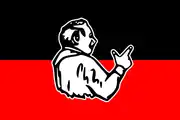 | |
| Website | |
| www.aiadmk.com | |
| |
| Articles related to |
| Dravidian politics |
|---|
From 9 February 1989 to 5 December 2016, AIADMK was led by the former chief minister of Tamil Nadu J. Jayalalithaa (Amma) as general secretary of the party. She was admired as Mother of the party by her cadre[10] and was highly popular among the Tamil populace until her death in 2016.[11] From 21 August 2017 to 23 June 2022, the party was led under dual leadership of the former chief ministers of Tamil Nadu O. Panneerselvam and Edappadi K. Palaniswami as coordinator and joint coordinator of the party respectively.[12][13][14]
From 11 July 2022, AIADMK is led by the former chief minister of Tamil Nadu Edappadi K. Palaniswami (E.P.S.) as general secretary of the party.[15][16]
The headquarters of the party is called Puratchi Thalaivar M.G.R. Maaligai, which is located at Avvai Shanmugam Salai, Royapettah, Chennai. The building was donated to the party in 1986 by M.G.R.'s wife V. N. Janaki Ramachandran, former chief minister of Tamil Nadu.
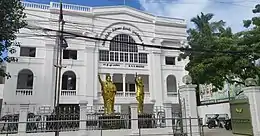
Ideology and policies
The AIADMK sought to depoliticize the education policy of the government by not insisting that education be in the Tamil language. Policies of AIADMK were targeted to the poorer segments of Tamil society – poor, rickshaw pullers, and destitute women and centralizing the massive noon meal scheme for children.[17][18] There was ambivalence toward the reservation policy and interests of farmers.[18]
The AIADMK posted an array of welfare schemes targeting the human development index of the state. AIADMK has schemes listed in the election manifestos covering segments of the population including fishermen, farmers, and school children. Till the 2000s, the parties had welfare schemes like maternity assistance, subsidized public transport, and educational grants. After the 2000s, the parties started competing at an increasing level for the distribution of consumer goods. The AIADMK government distributed free cycles to class 11 and class 12 students during its tenure of 2001–06. The DMK, in competition, promised free color televisions in its manifesto in 2006 assembly elections. The competition continued during the 2011 assembly elections when both parties announced free laptops for schools students and grinders mixers and fans for public.[19]
Culture
Economy
In the spring of 2019, the party lauded the economic policies of the Narendra Modi-led central government, stating that the centre had ushered in economic stability and made the country a "decisive player" in regional economics, and voiced support for the Goods and Services Tax (GST) which had been opposed by their rival the DMK.[22]
Social justice
- In 1980, the AIADMK under M. G. Ramachandran reversed his decision of economic criteria after the AIADMK faced a close defeat in the 1980 Indian general election in Tamil Nadu. He further raised the quota for the Backward Classes from 31 percent to 50 percent making the total reservation to 68%.[23]
- In 1993, J. Jayalalithaa's AIADMK government passed the Tamil Nadu Backward Classes, Scheduled Castes, and Scheduled Tribes Bill, 1993 in the Assembly (Act 45 of 1994).[24] The Bill was sent to the President for his approval. J. Jayalalithaa's AIADMK government led a cross-party committee of Tamil Nadu politicians to Delhi to meet with the Central government. She also demanded that the Tamil Nadu[25] government's Act be placed in the Constitution's Ninth Schedule, ensuring that it cannot be contested in any court. The President's signature was received, confirming the 69 percent reservation for Tamil Nadu.[26]
State water policy
- In 2006, AIADMK had initiated a case in the Supreme Court to uphold the state's rights on Mullaperiyar Dam issue. As a result, in May 2014, Supreme court verdict allowed the Tamil Nadu State to increase the storage level in the Mullaperiyar Dam to 142 feet from 136 ft and struck down the unconstitutional law enacted by the Kerala Government in 2006 restricting the storage level to 136 ft.[27] This Supreme Court Verdict sustained the livelihood of the farmers and people in the southern districts of Tamil Nadu.[28]
- In February 2013, the Union Government notified the final award of Cauvery Water Disputes Tribunal (CWDT) on the directions of the Supreme Court. Then Chief Minister Jayalalithaa termed it as a "tremendous achievement" of her government after 22 long years of legal battle, the State had got Due justice.[29] Then Jayalalithaa said that it was the happiest day of her life and the happiest day for the farmers in Tamil Nadu, she recalled her famous fast-unto-death at Marina beach in 1993.[30][31][32]
Environment and nature
- The AIADMK was one of two parties, along with BJP, not to voice opposition against a ban of cattle slaughter through the national Prevention of Cruelty to Animals Act. It has however sought an exemption in the Act over traditional bull fighting;[33] the party supports popular opinion in Tamil Nadu that traditional bull fighting, known as Jallikattu, should not be banned by the centre due to a ruling by the APEX court against animal cruelty.[34] During the controversy, The party called for animal-rights organisation PETA to be banned.[35]
- The AIADMK government has ordered the closure of the Sterlite Copper factory in Thoothukudi in the interest of the people, knowing that the air and water in the city are being heavily polluted by the factory, which has been at the center of violent protests by locals to protect and improve the environment.[36]
- AIADMK opposes the building of the Mekedatu Dam which could reduce water flows into Tamil Nadu and negatively affect quality-of-live for residents and agriculture.[37]
History
M. G. Ramachandran era (17 October 1972 – 24 December 1987)
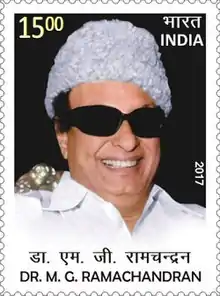
Founder of the party
The party was founded on 17 October 1972 as Anna Dravida Munnetra Kazhagam (ADMK) by M. G. Ramachandran, a veteran Tamil film star and popular politician. It was set up as a breakaway faction of the DMK led by M. Karunanidhi, then chief minister of Tamil Nadu, owing to personal differences between the two.[38] M.G.R., who wanted to start a new party, then incorporated Anakaputhur Ramalingam into the party which had registered under the name 'ADMK'. He then declared, ‘I joined the party started by an ordinary volunteer’ and gave the post of Member of Legislative Council (MLC) to Ramalingam. Later, M.G.R. prefixed the All India (AI) tag to the party's name to save himself from IT raids and protect the party during Maintenance of Internal Security Act (MISA).[39] Since its inception, the relationship between the AIADMK and DMK has been marked by mutual contempt. M.G.R. used his fan network to build the party cadre with claims his party recruited more than a million members in the first two months. C. N. Annadurai's ideologue and movie producer turned politician R. M. Veerappan was the key architect in unifying the M.G.R. fan clubs and further consolidating the party structure in the 70s. Other key leaders such as Nanjil K. Manoharan and S. D. Somasundaram played major roles in consolidation.[40] Pavalar M. Muthusamy was elected the first presidium chairman of the party.[41] The party's first victories were the win of Maya Thevar in Dindigul parliamentary bye-election in May 1973[42] and the win of C. Aranganayagam in Coimbatore West assembly bye-election a year later.[40] On 2 April 1973, AIADMK emerged as the third largest political party in Tamil Nadu, represented by 11 MLAs in the assembly. By 31 January 1976, AIADMK emerged as the second largest political party in Tamil Nadu with 16 MLAs in the assembly. AIADMK grew close to the Indian National Congress party by supporting the National Emergency between 1975 and 1977.
The DMK-led government was dismissed by a central promulgation on corruption charges in 1976. The AIADMK swept to power in 1977, defeating the DMK in the assembly election. M.G.R. sworn in as 3rd chief minister of the Tamil Nadu on 30 June 1977 and he remained in power until his death on 24 December 1987 by winning consecutive assembly elections held in 1980 and 1984.[38] In 1979, AIADMK became the first dravidian and regional party to be part of the Union Cabinet. Sathiavani Muthu and A. Bala Pajanor were the MPs joined the short-lived union ministry headed by Charan Singh, former prime minister of India.[39]
Relationship between the AIADMK and the INC slowly became strained. In the 1980 Indian general election, the INC aligned with the DMK and the alliance won 37 out of the 39 state parliamentary seats. The AIADMK won just two seats.[43] After returning to power Indira Gandhi dismissed a number of state governments belonging to the opposition parties, including the AIADMK government in Tamil Nadu.
Election in 1980 with the opposition DMK continuing the electoral alliance with the INC. In a massive reversal of fortunes following the Lok Sabha elections, the AIADMK won a comfortable majority in the state assembly with 129 of 234 seat. M.G.R. sworn in as chief minister for the second time on 9 June 1980.[43]
In 1984, even with M.G.R.'s failing health and hospitalization, the party won the assembly election in alliance with the INC. Many political historians consider M.G.R.'s persona and charisma at this point of time as "infallible", and a logical continuation of his on-screen "good lad" image, strengthened by his "mythical status" in the minds of the masses.[44] M.G.R. continued to enjoy popular support in his third tenure until his death on 24 December 1987.[44]
Succession crisis (25 December 1987 – 6 February 1989)
Following M.G.R.'s death, his wife, actress-turned-politician V. N. Janaki Ramachandran, rose to the party's leadership under support of R. M. Veerappan and 98 MLAs. She led the government for 23 days as the state's first female chief minister from 7 January 1988 until the state assembly was suspended on 30 January 1988 and President's rule imposed. The party began to crumble due to infighting and broke into two factions, one under Janaki Ramachandran and the other under J. Jayalalithaa, an associate of M.G.R. and another film actress-turned-politician who had starred with M.G.Ramachandran. The Election Commission Froze the "Two Leaves" symbol on 17 December 1988.[45] The 1989 assembly election saw the DMK regain power after 12 years in the opposition with M. Karunanidhi returning as the chief minister for the third time. AIADMK, due to its split, suffered heavily in the election, with the Janaki Ramachandran and Jayalalithaa factions winning only 2 and 27 seats respectively.[44] Following AIADMK's rout in the election, the factions led by Jayalalithaa and Janaki Ramachandran merged under the former's leadership on 10 February 1989, as Janaki decided that politics was not her forte. On 11 February 1989, Then Chief Election Commissioner R. V. S. Peri Sastri granted the Two Leaves symbol to the united AIADMK Party led by Jayalalithaa.[46] The AIADMK forged an alliance with the Indian National Congress (INC) in the 1989 lok sabha election and won 37 out of 39 seats in Tamil Nadu. The DMK government was dismissed in 1991 by the central government headed by then prime minister Chandra Shekhar, an ally of the AIADMK at that time, on charges that the constitutional machinery in the state had broken down.
J. Jayalalithaa era (9 February 1989 – 5 December 2016)
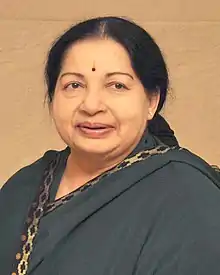
Former General Secretary of the party
The AIADMK allied with the Indian National Congress (INC) and swept to power in the 1991 assembly election under the leadership of J. Jayalalithaa who became the second female and fifth chief minister of the state. Political observers have ascribed the landslide victory to the anti-incumbent wave arising out of the assassination of the former prime minister Rajiv Gandhi[44] by suspected Tamil separatists fighting for a homeland in neighbouring Sri Lanka. The ensuing government, was accused of large-scale corruption, but Jayalalithaa held on to power for a full term of five years. In the 1996 assembly election, AIADMK continued its alliance with the INC but suffered a massive rout, winning only 4 out of the 234 assembly seats, with even Jayalalithaa losing from Bargur constituency.[47][48]
The AIADMK formed an alliance with the Bharatiya Janata Party (BJP) and Vaiko's Marumalarchi Dravida Munnetra Kazhagam (MDMK), another breakaway faction of the DMK, during the parliamentary election in 1998.[47] AIADMK shared power with the BJP in the Atal Bihari Vajpayee headed government between 1998 and 1999,[39] but withdrew support in early 1999, leading to the fall of the BJP government. Following this, the AIADMK once again allied with the INC.
In the 2001 assembly election, the AIADMK-led alliance, consisting of the Indian National Congress, the Tamil Maanila Congress (Moopanar) (TMC(M)), the Left Front and the Pattali Makkal Katchi (PMK), regained power, winning 197 seats, with AIADMK winning 132.[49] Due to the proceedings in a disproportionate assets case which occurred in her previous tenure, Jayalalithaa was prevented from holding office. O. Panneerselvam, a close confidant of Jayalalithaa was appointed as the Chief Minister for the first time on 21 September 2001. Once the Supreme Court of India overturned Jayalalithaa's conviction and sentence in the case, O. Panneerselvam resigned on 2 March 2002, and Jayalalithaa again sworn in as chief minister for the third time.[49]
Her second term was not marred by corruption scandals. She took many popular decisions such as banning of lottery tickets, restricting the liquor and sand quarrying business to government agencies and banning tobacco product sales near schools and colleges. She encouraged women to join the state police force by setting up all women-police stations and commissioning 150 women into the elite level police commandos in 2003, a first in India. The women had the same training as men and included handling weapons, detection and disposal of bombs, driving, horseriding, and adventure sports.[50] She sent a special task force to the Sathyamangalam forests in October 2004 to hunt down notorious sandalwood smuggler Veerappan. The operation was successful as he was killed by the task force on 18 October 2004.
However, despite the popular measures taken by the government, in the 2004 Lok Sabha election, the party, in alliance with the BJP again, was humiliated, winning none of the 39 Lok Sabha seats from the state. The Democratic Progressive Alliance (DPA), a DMK-led alliance consisting of all the major opposition parties in the state, swept the election.
Later, in the 2006 assembly election, in spite of media speculations of a hung assembly, the AIADMK, contesting with only the support of MDMK and a few other smaller parties, won 61 seats compared to the DMK's 96 and was pushed out of power by the DMK-led congressional alliance of the PMK and the Left Front. The AIADMK's electoral reversals continued in the 2009 Lok Sabha election. However, the party's performance was better than its debacle in 2004, and it managed to win nine seats.
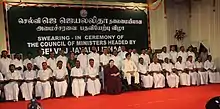
Following widespread corruption and allegations of nepotism against the DMK government, in the 2011 assembly election, the party, in alliance with parties like the left and actor-turned-politician Vijayakant's Desiya Murpokku Dravida Kazhagam (DMDK), swept the polls, winning 202 seats, with the AIADMK winning 150. Jayalalithaa was sworn in as Chief Minister for the fourth time.[49]
In the union territory of Puducherry, the AIADMK allied with N. Rangasamy's All India N.R. Congress (AINRC) and won the 2011 assembly election, which was held in parallel with the Tamil Nadu assembly election. However, it did not join the newly elected AINRC-led government. The AIADMK's good electoral performance continued in the 2014 Lok Sabha election. Contesting without allies, the AIADMK won an unprecedented 37 out of 39 seats in the state of Tamil Nadu, emerged as the third-largest party in parliament.
On 29 August 2014, J. Jayalalithaa was elected as the general secretary of the party for the 7th consecutive term, Making her the longest serving general secretary of the party until date. Earlier, She was elected in the years of 1988, 1989, 1993, 1998, 2003,[51] 2008[52] and 2014.[53] During her longest tenure as general secretary, V. R. Nedunchezhiyan, K. Kalimuthu, Pulamaipithan,[54] C. Ponnaiyan[55][56] and E. Madhusudhanan[57] were served as the presidium chairmen of the party.[41]
On 27 September 2014, Jayalalithaa was convicted in the Disproportionate assets case by a Special Court along with her associates V. K. Sasikala, Ilavarasi and V. N. Sudhakaran, and sentenced to four-year simple imprisonment. Jayalalithaa was also fined ₹100 crores and her associates were fined ₹10 crore each. The case had political implications as it was the first case where a ruling chief minister had to step down on account of a court sentence.[58]
Due to her resignation O. Panneerselvam was sworn in as Chief Minister on 29 September 2014.[59] Jayalalithaa was denied bail by the High Court and moved the Supreme Court for bail. The Supreme Court granted bail on 17 October 2014. On 11 May 2015, the high court of Karnataka said she was acquitted from that case, and was again sworn in as Chief Minister for the fifth time.
In the 2016 assembly election contesting without allies, the AIADMK swept the polls, winning 135 out of 234 seats. On 23 May 2016, Jayalalithaa was sworn in as Chief Minister for the sixth time.[49]
On 22 September 2016, she was admitted to Apollo Hospital, Chennai due to fever and dehydration. After a prolonged illness, she died on 5 December 2016.
Expansion beyond Tamil Nadu and Puducherry
Under Jayalalithaa's regime, All India Anna Dravida Munnetra Kazhagam spread beyond Tamil Nadu and Puducherry. State units are established in Andhra Pradesh, Karnataka, and Kerala. The party also has a following in places like Andaman and Nicobar Islands, Maharashtra, National Capital Territory of Delhi and Telangana in India, also in countries where Tamil people are present.
In Karnataka, the party had members in the state assembly from 1983 to 2004 and has influence in the Tamil-speaking areas of Bengaluru and Kolar.
In Andhra Pradesh and Kerala, the party contested in some legislative assembly elections, but did not win a single seat in any of the elections.
V. K. Sasikala and T. T. V. Dhinakaran era (31 December 2016 – 17 February 2017)
After J. Jayalalithaa's death on 5 December 2016, her long-time friend V. K. Sasikala was selected unanimously as the General Secretary of the party on 16 December 2016.[60][61] On February 5, 2017, she was selected as the leader of the legislative assembly as chief minister. O. Panneerselvam rebelled against V. K. Sasikala and reported that he had been compelled to resign as Chief Minister, bringing in a new twist to Tamil Nadu Politics. Due to a conviction in Disproportionate assets case against Jayalalithaa, Sasikala was sentenced to 4 years imprisonment in the Bengaluru Central Prison. Before that, she appointed Edappadi K. Palaniswami as legislative party leader (Chief Minister).
She also appointed her nephew and former Treasurer of the party T. T. V. Dhinakaran as the deputy general secretary of AIADMK party. With the support of 123 MLAs, Edappadi K. Palaniswami became chief minister of Tamil Nadu.
On 23 March 2017, the election commission of India gave separate party symbols to the two factions; O. Panneerselvam's faction known as AIADMK (PURATCHI THALAIVI AMMA), while Edappadi K. Palaniswami's faction known as AIADMK (AMMA).
By-polls were announced at the Dr. Radhakrishnan Nagar constituency which was vacated due to Jayalalithaa's death. But, the election commission canceled the by-polls after evidence of large-scale bribing by the ruling AIADMK (AMMA) surfaced. On 17 April 2017, Delhi police registered a case against Dhinakaran who was also the candidate for AIADMK (AMMA) for the by-poll at Dr. Radhakrishnan Nagar regarding an allegation of attempting to bribe the Election Commission of India (ECI) for the AIADMK's election symbol. However the Tis Hazari Special Court granted him bail on the grounds that the police failed to identify the public official allegedly bribed.
T. T. V. Dhinakaran started his party work on 5 August 2017. However, the chief minister Edappadi K. Palaniswami had a fallout with Dhinakaran and announced that the appointment of T. T. V. Dinakaran as deputy general secretary was invalid. So T. T. V. Dhinakaran claims that's "We are the real AIADMK and 95% of its cadres are with us."
Expulsion of V. K. Sasikala and T. T. V. Dhinakaran
On 12 September 2017, the AIADMK general council which appointed her earlier, cancelled V. K. Sasikala's appointment as general secretary and officially expelled her from the party as a primary member.[62][63]
Earlier on 10 August 2017, T. T. V. Dhinakaran was sacked as deputy general secretary at the meeting headed by Edappadi K. Palaniswami at Puratchi Thalaivar M.G.R. Maaligai.[64][63]
After completion of her imprisonment at Parappana Agrahara Central Prison, Sasikala filed a case in the City Civil Court IV of Chennai in February 2021, but it upheld her dismissal as the AIADMK general secretary in April 2022.[65]
O. Panneerselvam and Edappadi K. Palaniswami era (21 August 2017 – 23 June 2022)
On 21 August 2017, both O. Panneerselvam and Edappadi K. Palaniswami factions of the AIADMK merged and O. Panneerselvam was sworn in as the Deputy Chief Minister of Tamil Nadu with portfolio of Finance and the coordinator of AIADMK. He also holds portfolios of Housing, Rural Housing, Housing Development, Slum Clearance Board and Accommodation Control, Town Planning, Urban Development, and Chennai Metropolitan Development Authority.[66] On 4 January 2018, O. Panneerselvam was elected Leader of the House in Tamil Nadu Legislative Assembly.
On 12 September 2017, the AIADMK general council decided to cancel V. K. Sasikala's appointment as general secretary and officially expelled her from the party, though prominent members appointed to party posts by her were allowed to continue discharging their functions. Instead, the late J. Jayalalithaa was named the eternal general secretary of AIADMK.[62][63]
A day after the merger of two AIADMK factions, 19 MLAs[67] owing allegiance to ousted deputy general secretary T. T. V. Dhinakaran on 22 April 2017 submitted letters to Governor, expressing lack of confidence in Chief Minister Edappadi K. Palaniswami and withdrawing support from the government.[67] 18 out of those 19 MLAs were disqualified from office by the Speaker of Legislature upon recommendation from AIADMK Chief Whip. After a prolonged legal battle, the Speaker's orders were upheld by the High Court of Chennai and bye-elections were alongside the Parliament general elections. The election commission of India on 23 November 2017 granted the two leaves symbol to the O. Panneerselvam and Edappadi K. Palaniswami camp.
On 14 November 2017, AIADMK launched its own news channel News J, named after late AIADMK supremo J. Jayalalithaa replacing Jaya TV.[2][68] on 24 February 2018, AIADMK new mouthpiece Namadhu Amma a Tamil daily was launched marking 70th Birth anniversary of late AIADMK supremo J. Jayalalithaa.[1][69]
Despite the popular measures taken by the government, in the 2019 Lok Sabha election, the party, in alliance with the BJP again, was humiliated, winning one of the 39 Lok Sabha seats from the state. The Secular Progressive Alliance (SPA), a DMK-led alliance consisting of all the major opposition parties in the state, swept the election by winning 38 seats.
Later, in the 2021 assembly election, the AIADMK contested with the support of the same National Democratic Alliance (NDA) and a few other smaller parties, won 66 seats compared to the DMK's 133 seats and was pushed out of power by the DMK-led secular progressive alliance. After the election, the AIADMK emerged as the main party of the opposition in the assembly. On 11 May 2021, party joint coordinator Edappadi K. Palaniswami recognized as the Leader of the Opposition in the Tamil Nadu Legislative Assembly and on 14 June 2021, party coordinator O. Panneerselvam recognized as the Deputy Leader of the Opposition in the Tamil Nadu Legislative Assembly by M. Appavu, Speaker of the assembly.
Legal Fight for the party by V. K. Sasikala and T. T. V. Dhinakaran
After that V. K. Sasikala and T. T. V. Dhinakaran had appealed to the Delhi High Court, who rejected their appeal and said that O. Panneerselvam and Edappadi K. Palaniswami camp are the original AIADMK.
After that T. T. V. Dhinakaran had also appealed to the Supreme Court of India on March 15, the bench of Chief Justice of India has also rejected his appeal against the judgement made by Delhi High Court in favor of O. Panneerselvam and Edappadi K. Palaniswami camp.
Following this, the General Council passed a resolution removing V. K. Sasikala from the post of General Secretary. V. K. Sasikala and T. T. V. Dhinakaran jointly filed a suit in the High Court challenging the decision of the General Council. Since it was a civil case, the case was transferred to the City Civil Court. During the hearing on April 9, 2021, Dinakaran told the court that he would withdraw from the case as he had started a party called Amma Makkal Munnettra Kazagam. At the same time, Sasikala told the court that she wanted to continue the case. The court dismissed her plea following an interlocutory application from AIADMK Coordinator O. Panneerselvam and Joint Coordinator Edappadi K. Palaniswami.[70]
Tensions with BJP
A war of words has raged publicly in June 2022 between AIADMK and BJP.[71] AIADMK organisational secretary C. Ponnaiyan in June 2022, accused the BJP-led Central government of stealing Tamil Nadu's's revenue, as well as blaming AIADMK for election losses, loss of minority community support, and "anti-Tamil" policies, particularly those affecting students.[72] He also called the alliance a "electoral adjustment," claiming that the BJP was attempting to expand at the cost of the AIADMK in Tamil Nadu and ideology is diametrically opposite to that of the AIADMK.[73][74] The event reportedly had party cadres reverberating these sentiments, albeit in a lighter tone, and agreeing that the BJP was attempting to wrest control of the state's opposition from the AIADMK.[71]
Leadership tussle between OPS and EPS
On 14 June 2022, Citing the party's troubles in the polls, AIADMK district secretaries and other senior party members spoke out to shun the “dual leadership” system and came out publicly in favor of strong unitary leader to strengthen the organisation.
Edappadi K. Palaniswami supporters pushed for the change in the party's leadership structure by staging a political coup against AIADMK Coordinator O. Panneerselvam, who had become weak within the party. According to many sources, of the AIADMK's 75 district secretaries, hardly 10 supported him. Of the party's 66 MLAs, only five MLAs were reportedly on O. Panneerselvam side and less than 20 percent of the party's general council members behind him ahead of crucial general council meeting on 23 June 2022, which was expected to elect the single leadership to the party.[75]
On 23 June 2022, A. Tamil Magan Hussain was unanimously elected as the Presidium Chairman of the party at a general council meeting held at the Shrivaaru Venkatachalapathy Palace in Vanagaram, Chennai.[76][77] On the same day, Presidium Chairman Tamil Magan Hussain announced that the next general council meeting of the party would be held on 11 July 2022.[78][79]
On 30 June 2022, Edappadi K. Palaniswami wrote a letter to O. Panneerselvam asserting the latter ceased to be the party coordinator as the amendments made to the party's bylaw in the 2020 December executive committee meeting were not recognised in the general council meeting held on 23 June 2022.[80][81]
Edappadi K. Palaniswami era (11 July 2022 – Present)
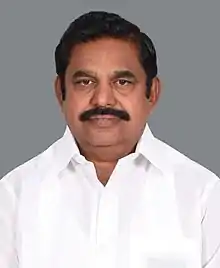
Interim General Secretary of the party
On 11 July 2022, AIADMK general council meeting held at the Shrivaaru Venkatachalapathy Palace in Vanagaram following the dismissal of a petition by O. Panneerselvam in the Madras High Court.[82] The party general council abolished the dual leadership model and empowered Edappadi K. Palaniswami as the Interim General Secretary, and called for organisational elections in 4 months.[83] Before the general council meeting there was violence at the Puratchi Thalaivar M.G.R. Maaligai in Royapettah, where the supporters of Palaniswami and Panneerselvam threw stones, bottles, plastic chairs at each other and damaged several vehicles nearby.[84] Following this the Revenue Department of Tamil Nadu sealed the Puratchi Thalaivar M.G.R. Maaligai, overall 47 people were injured in the clashes.[85]
The general council meeting made 20 amendments to the AIADMK bylaws including the removal of rule 20 which had described J. Jayalalithaa as the "eternal general secretary", reviving the post of General Secretary, transferring all the powers of Coordinator and Joint coordinator to the General Secretary, and abolished the posts of Coordinator and Joint coordinator. These changes in effect ended dual leadership in the party.[86]
Expulsion of O. Panneerselvam
In the general council meeting held on 11 July 2022, the general council members passed the resolution and expelled the former coordinator O. Panneerselvam,[87] the former deputy coordinator R. Vaithilingam, P. H. Manoj Pandian and J. C. D. Prabhakar from their respective posts and primary membership of the party for "anti-party" activities.[88][89]
On 11 July 2022, former chief Minister of Tamil Nadu Edappadi K. Palaniswami was unanimously elected as the Interim General Secretary of the party in the general council meeting held at the Shrivaaru Venkatachalapathy Palace in Vanagaram, Chennai.[15] Palaniswami appointed Dindigul C. Srinivasan as the treasurer of the party replacing O. Panneerselvam.[90] On 19 July 2022, Palaniswami appointed R. B. Udhayakumar as the deputy leader of the opposition in the Tamil Nadu Legislative Assembly replacing Panneerselvam which declared in the party's legislative members meeting held on 17 July 2022.[91][92]
On 20 July 2022, The Madras High Court ordered to remove the seal of Puratchi Thalaivar M.G.R. Maaligai and handover the keys to the interim general secretary Edappadi K. Palaniswami.[93] Earlier, It was locked and sealed on 11 July 2022.[94][95] On 12 September 2022, The Supreme Court dismissed the petition of O. Panneerselvam challenging the Madras High Court's order to handover the keys to Palaniswami.[96]
Legal Fight for the party between Palaniswami and Panneerselvam
The Madras High Court on 17 August 2022 ruled in favour of O. Panneerselvam and declared the AIADMK general council meeting held on 11 July 2022 which had abolished dual leadership as void ab initio. The court called for the restoration of the status quo as it existed on June 23, and has prevented the party from convening any meet of the executive council or the general council of the party without joint consent from both Palaniswami and Panneerselvam, thus effectively restoring dual leadership. The court cited procedural lapses to declare the 11 July general council meeting invalid, and found that there was no data to prove E. Palaniswami's claim that 95% of the 1.5 crore (15 million) primary party members supported unitary leadership under him.[97][98][99][100]
Edappadi K. Palaniswami appealed the single judge court order to a larger bench of judges.[101] Following the order, O. Panneerselvam appealed for party unity, which also included the splinter AMMK group.[102] Palaniswamy dismissed this appeal as a power hungry move by Panneerselvam and held him responsible for violence in the party headquarters.[103]
On 2 September 2022, a division bench of the Madras High Court upheld the decisions of the AIADMK general council meeting held on 11 June 2022 and set aside the previous court order of the single judge in the appeal case of Edappadi K. Palaniswami, thus effectively restoring unitary leadership.[104][16]
Criticism
Being a popular actor, M.G.R.'s fan clubs became a source for electoral mobilization. The head of his fan club, R. M. Veerappan, became a lieutenant, and fellow actress J. Jayalalithaa was groomed as a possible heir apparent.[105] There was a near administrative collapse during M.G.R.'s rule, and the state's rank in industrial production dropped from 3rd in the nation in 1977 to 13th position in 1987.[105] Populist schemes that consumed two-thirds of the state's budget resulted in long-term economic costs.[105] M.G.R. was running a centralized administration which caused a severe toll on the state administration during his extended period of illness.[106]
Personality cult
Jayalalithaa was also accused of creating a personality cult, with fans and party activists calling her 'Amma' ('mother' in Tamil). Her face adorned food canteens, pharmacies, salt packets, laptop computers, baby care kits, bottled water, medicine shops and cement bags. Following her imprisonment on 27 September 2014, her supporters held protests and wept openly. Her replacement, the party's former minister O. Panneerselvam, also wept during his inauguration, with colleagues saying they were in mourning.[107] Due to the centralized leadership of Jayalalithaa, the state of Tamil Nadu experienced policy paralysis, with most legislators and party cadres protesting against her conviction with hunger fasts, road and rail blockades.[108][109] The entire Cabinet would fall in line and bow in front of the helicopter in which it was flying. Members of the party, at all levels never found it difficult to prostrate before her in full view of the public.[110] Even after her death, the AIADMK leaders continued to prostrate themselves before her burial ground.[111][112]
Debt crisis
The overall debt burden of Tamil Nadu is expected to reach more than ₹ 5 lakh crore by March 31, 2022, during the AIADMK government.[113] Under Jayalalithaa and the AIADMK tenure, the State debt as percentage of GSDP was about 5% increase in 2011. It was 16.92% in 2011–12. It was 21.83% as of April 2021 during the Edappadi K. Palaniswami's government.[114] The opposition criticized the financial mismanagement by the AIADMK who left a ₹ 62,000 per head for each person of the state. The opposition criticized that the entire debt of the state government in the 2006–11 DMK regime was only Rs 44,000 crore, but the AIADMK regime has made a debt of ₹ 3.55 lakh crore.[115] The overall debt the AIADMK government left behind as of March 31, 2021 is estimated to be ₹ 4,85,502.54 crore and as on March 31, 2022, it is estimated to be ₹ 5,70,189.29 crore.[116]
Electoral performance
Indian general elections
| Year | Party leader | Seats contested | Seats won | Change in seats | Percentage of votes | Vote swing | Popular vote | Result |
|---|---|---|---|---|---|---|---|---|
| 1977 | M. G. Ramachandran | 21 | 18 / 542 |
2.90% | 54,80,378 | Government | ||
| 1980 | 24 | 2 / 542 |
2.36% | 46,74,064 | Opposition | |||
| 1984 | 12 | 12 / 533 |
1.69% | 39,68,967 | Government | |||
| 1989 | J. Jayalalithaa | 11 | 11 / 545 |
1.50% | 45,18,649 | Opposition | ||
| 1991 | 11 | 11 / 545 |
1.62% | 44,70,542 | Government | |||
| 1996 | 10 | 0 / 545 |
0.64% | 21,30,286 | Lost | |||
| 1998 | 23 | 18 / 545 |
1.83% | 67,31,550 | Government | |||
| 1999 | 29 | 10 / 545 |
1.93% | 70,46,953 | Opposition | |||
| 2004 | 33 | 0 / 543 |
2.19% | 85,47,014 | Lost | |||
| 2009 | 23 | 9 / 543 |
1.67% | 69,53,591 | Others | |||
| 2014 | 40 | 37 / 543 |
3.27% | 1,81,11,579 | ||||
| 2019 | O. Panneerselvam and Edappadi K. Palaniswami | 21 | 1 / 543 |
1.28% | 78,30,146 | Government |
State legislative assembly elections
| Year | Party leader | Seats contested | Seats won | Change in seats | Percentage of votes | Vote swing | Popular vote | Result |
|---|---|---|---|---|---|---|---|---|
| 1977 | M. G. Ramachandran | 200 | 130 / 234 |
30.36% | 51,94,876 | Government | ||
| 1980 | 177 | 129 / 234 |
38.75% | 73,03,010 | ||||
| 1984 | 155 | 132 / 234 |
37.03% | 80,30,809 | ||||
| 1989 | J. Jayalalithaa | 202 | 29 / 234 |
21.77% | 52,47,317 | Opposition | ||
| 1991 | 168 | 164 / 234 |
44.39% | 1,09,40,966 | Government | |||
| 1996 | 168 | 4 / 234 |
21.47% | 58,31,383 | Others | |||
| 2001 | 141 | 132 / 234 |
31.44% | 88,15,387 | Government | |||
| 2006 | 188 | 61 / 234 |
32.64% | 1,07,68,559 | Opposition | |||
| 2011 | 165 | 150 / 234 |
38.40% | 1,41,50,289 | Government | |||
| 2016 | 234 | 136 / 234 |
40.77% | 1,76,16,266 | ||||
| 2021 | O. Panneerselvam and Edappadi K. Palaniswami | 191 | 66 / 234 |
33.29% | 1,53,91,055 | Opposition | ||
| Year | Party leader | Seats contested | Seats won | Change in seats | Percentage of votes | Vote swing | Popular vote | Result |
|---|---|---|---|---|---|---|---|---|
| 1974 | M. G. Ramachandran | 21 | 12 / 30 |
27.83% | 60,812 | Government | ||
| 1977 | 27 | 14 / 30 |
30.96% | 69,873 | ||||
| 1980 | 18 | 0 / 30 |
18.60% | 45,623 | Lost | |||
| 1985 | 10 | 6 / 30 |
15.75% | 47,521 | Opposition | |||
| 1990 | J. Jayalalithaa | 13 | 3 / 30 |
18.17% | 76,337 | |||
| 1991 | 10 | 6 / 30 |
17.34% | 67,792 | Government | |||
| 1996 | 10 | 3 / 30 |
12.53% | 57,678 | Opposition | |||
| 2001 | 20 | 3 / 30 |
12.56% | 59,926 | Government | |||
| 2006 | 18 | 3 / 30 |
16.04% | 90,699 | Others | |||
| 2011 | 10 | 5 / 30 |
13.75% | 95,960 | Government | |||
| 2016 | 30 | 4 / 30 |
16.82% | 1,34,597 | Opposition | |||
| 2021 | O. Panneerselvam and Edappadi K. Palaniswami | 5 | 0 / 30 |
4.14% | 34,623 | Lost |
| Year | Party leader | Seats contested | Seats won | Change in seats | Percentage of votes | Vote swing | Popular vote | Result |
|---|---|---|---|---|---|---|---|---|
| 1978 | M. G. Ramachandran | 7 | 0 / 224 |
0.18% | 22,310 | Lost | ||
| 1983 | 1 | 1 / 224 |
0.13% | 16,234 | Government | |||
| 1989 | J. Jayalalithaa | 1 | 1 / 224 |
0.18% | 32,928 | |||
| 1994 | 4 | 1 / 224 |
0.24% | 50,696 | Opposition | |||
| 1999 | 13 | 1 / 224 |
0.18% | 39,865 | Government | |||
| 2004 | 2 | 0 / 224 |
0.07% | 16,737 | Lost | |||
| 2008 | 7 | 0 / 224 |
0.03% | 9,088 | ||||
| 2013 | 5 | 0 / 224 |
0.03% | 10,280 | ||||
| 2018 | O. Panneerselvam and Edappadi K. Palaniswami | 3 | 0 / 224 |
0.01% | 2,072 |
| Year | Party leader | Seats contested | Seats won | Change in seats | Percentage of votes | Vote swing | Popular vote | Result |
|---|---|---|---|---|---|---|---|---|
| 1977 | M. G. Ramachandran | 2 | 0 / 140 |
0.02% | 2,114 | Lost | ||
| 1980 | 1 | 0 / 140 |
0.00% | 224 | ||||
| 2006 | J. Jayalalithaa | 29 | 0 / 140 |
0.12% | 19,078 | |||
| 2011 | 4 | 0 / 140 |
0.01% | 2,448 | ||||
| 2016 | 7 | 0 / 140 |
0.17% | 33,440 | ||||
| 2021 | O. Panneerselvam and Edappadi K. Palaniswami | 1 | 0 / 140 |
0.05% | 10,376 |
| Year | Party leader | Seats contested | Seats won | Change in seats | Percentage of votes | Vote swing | Popular vote | Result |
|---|---|---|---|---|---|---|---|---|
| 1978 | M. G. Ramachandran | 9 | 0 / 294 |
0.19% | 38,691 | Lost | ||
| 1994 | J. Jayalalithaa | 2 | 0 / 294 |
0.05% | 14,251 | |||
| 1999 | 5 | 0 / 294 |
0.02% | 7,281 |
Current office bearers and prominent members
| Member | Position in Government | Party Position |
|---|---|---|
| Edappadi K. Palaniswami |
|
Interim General Secretary |
| K. P. Munusamy |
|
Deputy General Secretary |
| Natham R. Viswanathan |
|
Deputy General Secretary |
| A. Tamil Magan Hussain |
|
Presidium Chairman |
| Dindigul C. Srinivasan |
|
Treasurer |
| M. Thambidurai |
|
Rajya Sabha Leader and Propaganda Secretary |
| S. P. Velumani |
|
Puratchi Thalaivar M.G.R. Maaligai Secretary |
| R. B. Udhayakumar |
|
Puratchi Thalaivi Amma Federation Secretary |
| S. Ravi |
|
Ranipet District Secretary |
| Kadambur C. Raju |
|
Thoothukkudi North District Secretary |
| K. P. Anbalagan |
|
Dharmapuri District Secretary |
| Agri S.S. Krishnamoorthy |
|
Agriculture Wing Secretary |
| C. Ponnaiyan |
|
All World M.G.R. Forum Secretary |
| Pollachi V. Jayaraman |
|
Election Wing Secretary |
| B. Valarmathi |
|
Women's Wing Secretary |
| A. Justin Selvaraj | Minority Welfare Wing Secretary | |
| Thadi Ma. Rasu | Anna Trade Union Federation President | |
| P. Venugopal |
|
Medical Wing Secretary |
| V. S. Sethuraman | Advocate Wing President | |
| Vaigaichelvan |
|
Literature Wing Secretary |
| R. Kamalakannan | Anna Trade Union Federation Secretary | |
| K. Sankaradas | Non-organizational Driver Wing Secretary | |
| S. R. Vijayakumar |
|
Student Wing Secretary |
| N. R. Sivapathi |
|
M.G.R. Youth Wing Secretary |
| V. P. B. Paramasivam |
|
Youth Brigade Secretary |
| Singai G. Ramachandran | IT Wing Secretary | |
| State Unit Secretaries | ||
| A. Anbalagan |
|
Puducherry (East) Unit Secretary |
| S. D. Kumar | Karnataka Unit Secretary | |
| G. Shobakumar | Kerala Unit Secretary | |
List of party leadership
President
| No. | Portrait | Name (Birth–Death) |
Term in Office | ||
|---|---|---|---|---|---|
| Assumed Office | Left Office | Time in Office | |||
| 1 |  |
M. G. Ramachandran (1917–1987) |
17 October 1972 | 24 December 1987 | 15 years, 68 days |
General Secretaries
| No. | Portrait | Name (Birth–Death) |
Term in Office | ||
|---|---|---|---|---|---|
| Assumed Office | Left Office | Time in Office | |||
| 1 |  |
M. G. Ramachandran (1917–1987) |
17 October 1972 | 22 June 1978 | 6 years, 316 days |
| 17 October 1986 | 24 December 1987 | ||||
| 2 |  |
V. R. Nedunchezhiyan (1920–2000) |
23 June 1978 | 10 June 1980 | 3 years, 33 days |
| 25 December 1987 | 8 February 1989 | ||||
| 3 | 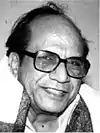 |
P. U. Shanmugam (1924–2007) |
11 June 1980 | 13 March 1985 | 4 years, 275 days |
| 4 | 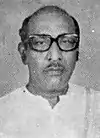 |
S. Raghavanandam (1917–1999) |
14 March 1985 | 16 October 1986 | 1 year, 216 days |
| 5 |  |
J. Jayalalithaa (1948–2016) |
9 February 1989 | 5 December 2016 | 27 years, 300 days |
| Acting |  |
V. K. Sasikala (1954–) |
31 December 2016 | 17 February 2017 | 48 days |
| Interim |  |
Edappadi K. Palaniswami (1954–) |
11 July 2022 | Incumbent | 106 days |
Coordinators
| No. | Portrait | Name (Birth–Death) |
Term in Office | ||
|---|---|---|---|---|---|
| Assumed Office | Left Office | Time in Office | |||
| 1 | 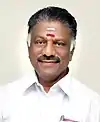 |
Coordinator O. Panneerselvam (1951–) |
21 August 2017 | 23 June 2022 | 4 years, 306 days |
 |
Joint Coordinator Edappadi K. Palaniswami (1954–) | ||||
Legislative leaders
List of union cabinet ministers
| No. | Portrait | Name (Birth–Death) |
Portfolio | Term in Office | Constituency (House) |
Prime Minister | |||
|---|---|---|---|---|---|---|---|---|---|
| Assumed Office | Left Office | Time in Office | |||||||
| 1 | 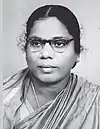 |
Sathiavani Muthu (1923–1999) |
Minister of Social Welfare | 19 August 1979 | 23 December 1979 | 126 days | Tamil Nadu (Rajya Sabha) |
Charan Singh | |
| 2 |  |
A. Bala Pajanor (1935–2013) |
Minister of Petroleum, Chemicals and Fertilizers | Puducherry (Lok Sabha) | |||||
| 3 |  |
R. Muthiah (1945–2022) |
Minister of Surface Transport | 19 March 1998 | 8 April 1998 | 20 days | Periyakulam (Lok Sabha) |
Atal Bihari Vajpayee | |
| 4 |  |
M. Thambidurai (1947–) |
Minister of Law, Justice and Company Affairs | 19 March 1998 | 8 April 1999 | 1 year, 20 days | Karur (Lok Sabha) | ||
| Minister of Surface Transport | 8 April 1998 | 1 year | |||||||
List of chief ministers
Chief Ministers of Tamil Nadu
| No. | Portrait | Name (Birth–Death) |
Term in Office | Assembly (Election) |
Constituency | Ministry | ||
|---|---|---|---|---|---|---|---|---|
| Assumed Office | Left Office | Time in Office | ||||||
| 1 |  |
M. G. Ramachandran (1917–1987) |
30 June 1977 | 17 February 1980 | 10 years, 65 days | 6th (1977 election) |
Aruppukottai | Ramachandran I |
| 9 June 1980 | 9 February 1985 | 7th (1980 election) |
Madurai West | Ramachandran II | ||||
| 10 February 1985 | 24 December 1987 | 8th (1984 election) |
Andipatti | Ramachandran III | ||||
| Acting |  |
V. R. Nedunchezhiyan (1920–2000) |
24 December 1987 | 7 January 1988 | 14 days | Athoor | Nedunchezhiyan II | |
| 2 |  |
V. N. Janaki Ramachandran (1924–1996) |
7 January 1988 | 30 January 1988 | 23 days | Did not contest | Janaki | |
| 3 |  |
J. Jayalalithaa (1948–2016) |
24 June 1991 | 12 May 1996 | 14 years, 124 days | 10th (1991 election) |
Bargur | Jayalalithaa I |
| 14 May 2001 | 21 September 2001 | 12th (2001 election) |
Did not contest | Jayalalithaa II | ||||
| 2 March 2002 | 12 May 2006 | Andipatti | Jayalalithaa III | |||||
| 16 May 2011 | 27 September 2014 | 14th (2011 election) |
Srirangam | Jayalalithaa IV | ||||
| 23 May 2015 | 22 May 2016 | Dr. Radhakrishnan Nagar | Jayalalithaa V | |||||
| 23 May 2016 | 5 December 2016 | 15th (2016 election) |
Jayalalithaa VI | |||||
| 4 |  |
O. Panneerselvam (1951–) |
21 September 2001 | 2 March 2002 | 1 year, 106 days | 12th (2001 election) |
Periyakulam | Panneerselvam I |
| 28 September 2014 | 23 May 2015 | 14th (2011 election) |
Bodinayakanur | Panneerselvam II | ||||
| 5 December 2016 | 15 February 2017 | 15th (2016 election) |
Panneerselvam III | |||||
| 5 |  |
Edappadi K. Palaniswami (1954–) |
16 February 2017 | 6 May 2021 | 4 years, 79 days | Edappadi | Palaniswami | |
Chief Minister of Puducherry
| No. | Portrait | Name (Birth–Death) |
Term in Office | Assembly (Election) |
Constituency | Ministry | ||
|---|---|---|---|---|---|---|---|---|
| Assumed Office | Left Office | Time in Office | ||||||
| 1 |  |
S. Ramassamy (1939–2017) |
6 March 1974 | 28 March 1974 | 1 year, 155 days | 4th (1974 election) |
Karaikal South | Ramassamy I |
| 2 July 1977 | 12 November 1978 | 5th (1977 election) |
Ramassamy II | |||||
List of deputy chief minister
Deputy Chief Minister of Tamil Nadu
| No. | Portrait | Name (Birth–Death) |
Term in Office | Assembly (Election) |
Constituency | Chief Minister | ||
|---|---|---|---|---|---|---|---|---|
| Assumed Office | Left Office | Time in Office | ||||||
| 1 |  |
O. Panneerselvam (1951–) |
21 August 2017 | 6 May 2021 | 3 years, 258 days | 15th (2016 election) |
Bodinayakanur | Edappadi K. Palaniswami |
List of deputy speaker of the Lok Sabha
| No. | Portrait | Name (Birth–Death) |
Term in Office | Lok Sabha (Election) |
Constituency | Speaker | |||
|---|---|---|---|---|---|---|---|---|---|
| Assumed Office | Left Office | Time in Office | |||||||
| 1 |  |
M. Thambidurai (1947–) |
22 January 1985 | 27 November 1989 | 9 years, 229 days | 8th (1984 election) |
Dharmapuri | Balram Jakhar | |
| 13 August 2014 | 25 May 2019 | 16th (2014 election) |
Karur | Sumitra Mahajan | |||||
List of union ministers of state
| No. | Portrait | Name (Birth–Death) |
Portfolio | Term in Office | Constituency (House) |
Cabinet Minister | Prime Minister | ||||
|---|---|---|---|---|---|---|---|---|---|---|---|
| Assumed Office | Left Office | Time in Office | |||||||||
| 1 |  |
R. K. Kumar (1942–1999) |
Minister of State for Parliamentary Affairs | 19 March 1998 | 22 May 1998 | 64 days | Tamil Nadu (Rajya Sabha) |
Madan Lal Khurana | Atal Bihari Vajpayee | ||
| Minister of State for Finance | 20 March 1998 | 63 days | Yashwant Sinha | ||||||||
| 2 |  |
Kadambur M. R. Janarthanan (1929–2020) |
Minister of State for Personnel, Public Grievances and Pensions | 20 March 1998 | 8 April 1999 | 1 year, 19 days | Tirunelveli (Lok Sabha) |
Atal Bihari Vajpayee | |||
| Minister of State for Finance | 22 May 1998 | 321 days | Yashwant Sinha | ||||||||
List of speakers
Speakers of the Tamil Nadu Legislative Assembly
| No. | Portrait | Name (Birth–Death) |
Term in Office | Assembly (Election) |
Constituency | ||
|---|---|---|---|---|---|---|---|
| Assumed Office | Left Office | Time in Office | |||||
| 1 |  |
Munu Adhi (1926–2005) |
6 July 1977 | 18 June 1980 | 2 years, 348 days | 6th (1977 election) |
Tambaram |
| 2 | 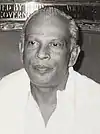 |
K. Rajaram (1926–2008) |
21 June 1980 | 24 February 1985 | 4 years, 248 days | 7th (1980 election) |
Panamarathupatti |
| 3 |  |
P. H. Pandian (1945–2020) |
27 February 1985 | 5 February 1989 | 3 years, 344 days | 8th (1984 election) |
Cheranmadevi |
| 4 |  |
R. Muthiah (1945–2022) |
3 July 1991 | 21 May 1996 | 4 years, 323 days | 10th (1991 election) |
Sedapatti |
| 5 |  |
K. Kalimuthu (1942–2006) |
24 May 2001 | 1 February 2006 | 4 years, 253 days | 12th (2001 election) |
Thirumangalam |
| 6 |  |
D. Jayakumar (1960–) |
27 May 2011 | 29 September 2012 | 1 year, 125 days | 14th (2011 election) |
Royapuram |
| 7 |  |
P. Dhanapal (1951–) |
10 October 2012 | 24 May 2016 | 8 years, 196 days | Rasipuram | |
| 3 June 2016 | 3 May 2021 | 15th (2016 election) |
Avanashi | ||||
Speakers of the Puducherry Legislative Assembly
| No. | Portrait | Name (Birth–Death) |
Term in Office | Assembly (Election) |
Constituency | ||
|---|---|---|---|---|---|---|---|
| Assumed Office | Left Office | Time in Office | |||||
| 1 |  |
S. Pakkiam (unknown–unknown) |
26 March 1974 | 28 March 1974 | 2 days | 4th (1974 election) |
Bussy |
List of leaders of the opposition
Leaders of the Opposition in the Tamil Nadu Legislative Assembly
| No. | Portrait | Name (Birth–Death) |
Term in Office | Assembly (Election) |
Constituency | ||
|---|---|---|---|---|---|---|---|
| Assumed Office | Left Office | Time in Office | |||||
| 1 |  |
J. Jayalalithaa (1948–2016) |
9 February 1989 | 1 December 1989 | 5 years, 280 days | 9th (1989 election) |
Bodinayakanur |
| 29 May 2006 | 14 May 2011 | 13th (2006 election) |
Andipatti | ||||
| 2 |  |
S. R. Eradha (1934–2020) |
1 December 1989 | 19 January 1991 | 1 year, 49 days | 9th (1989 election) |
Madurai East |
| 3 |  |
O. Panneerselvam (1951–) |
19 May 2006 | 28 May 2006 | 9 days | 13th (2006 election) |
Periyakulam |
| 4 |  |
Edappadi K. Palaniswami (1954–) |
11 May 2021 | Incumbent | 1 year, 167 days | 16th (2021 election) |
Edappadi |
Leaders of the Opposition in the Puducherry Legislative Assembly
| No. | Portrait | Name (Birth–Death) |
Term in Office | Assembly (Election) |
Constituency | ||
|---|---|---|---|---|---|---|---|
| Assumed Office | Left Office | Time in Office | |||||
| 1 |  |
P. K. Loganathan (1938–2013) |
16 March 1985 | 4 March 1990 | 4 years, 353 days | 7th (1985 election) |
Oupalam |
| 2 |  |
V. M. C. V. Ganapathy (1960–) |
4 July 1991 | 13 May 1996 | 4 years, 314 days | 9th (1991 election) |
Neravy T. R. Pattinam |
List of deputy leaders of the opposition
Deputy leaders of the Opposition in the Tamil Nadu Legislative Assembly
| No. | Portrait | Name (Birth–Death) |
Term in Office | Assembly (Election) |
Constituency | Leader of the Opposition | ||
|---|---|---|---|---|---|---|---|---|
| Assumed Office | Left Office | Time in Office | ||||||
| 1 |  |
Su. Thirunavukkarasar (1949–) |
9 February 1989 | 19 January 1991 | 1 year, 344 days | 9th (1989 election) |
Aranthangi | J. Jayalalithaa
S. R. Eradha |
| 2 | 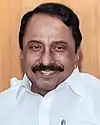 |
K. A. Sengottaiyan (1948–) |
19 May 2006 | 28 May 2006 | 9 days | 13th (2006 election) |
Gobichettipalayam | O. Panneerselvam |
| 3 |  |
O. Panneerselvam (1951–) |
29 May 2006 | 14 May 2011 | 6 years, 12 days | Periyakulam | J. Jayalalithaa | |
| 14 June 2021 | 11 July 2022 | 16th (2021 election) |
Bodinayakanur | Edappadi K. Palaniswami | ||||
| 4 |  |
R. B. Udhayakumar (1973–) |
19 July 2022 | Incumbent | 98 days | Thirumangalam | ||
References
- "AIADMK mouthpiece to be launched on February 24". thehindu. 22 February 2018. Retrieved 23 February 2018.
- "AIADMK Launches Its Own News Channel Named After Jayalalithaa". outlookindia. 13 September 2018. Retrieved 13 September 2018.
- Price, P. (1996). Revolution and Rank in Tamil Nationalism. The Journal of Asian Studies, 55(2), 359-383. doi:10.2307/2943363
- Pamela Price (1999) Relating to leadership in the Tamil nationalist movement: C.N. Annadurai in person‐centred propaganda, South Asia: Journal of South Asian Studies, 22:2, 149-174, doi:10.1080/00856409908723369
- "List of Political Parties and Election Symbols main Notification Dated 18.01.2013" (PDF). India: Election Commission of India. 2013. Retrieved 9 May 2013.
- R Kannan (7 August 2018). "Karunanidhi and M.G.R.: A checkered friendship, and a lesson in civility and empathy". The News Minute.
- "When Annaism sought de-mon". The New Indian Express. 15 August 2017.
- "Jayalalithaa changed face of Dravidian politics". Deccan Chronicle. 6 December 2016.
- "Tamil Nadu pact sealed, brings AIADMK back to NDA fold". Hindustan Times. 19 February 2019. Retrieved 7 May 2021.
- Narasimhan, T. E. (11 May 2015). "Extended 'Mothers' Day' for AIADMK cadre as 'Amma' Jayalalithaa walks free". Business Standard India. Retrieved 3 October 2019.
- "Jayalalitha: The 'goddess' of Tamil Nadu politics". BBC News. 5 December 2016. Retrieved 5 December 2016.
- "EPS vs OPS in Tamil Nadu: What's all this AIADMK fuss about?". timesofindia. 23 June 2022.
- "Dual power structure not in force, OPS ceases to be coordinator, says AIADMK". economictimes. 24 June 2022.
- "OPS, EPS elected unopposed as AIADMK coordinator and joint coordinator". The Times of India. 6 December 2021.
- "AIADMK general council anoints Edappadi K Palaniswami as party interim general secretary". The Times of India. 11 July 2022. Retrieved 11 July 2022.
- S, Mohamed Imranullah (2 September 2022). "AIADMK leadership tussle: Division Bench of Madras High Court reverses earlier order in favour of OPS". The Hindu. Retrieved 2 September 2022.
- "പനീർസെൽവത്തിന് ചിഹ്നം വൈദ്യുതി പോസ്റ്റ്, ശശികല പക്ഷത്തിന് തൊപ്പി". ManoramaOnline (in Malayalam).
- Sinha 2005, p. 107
- Kohli, Atul; Singh, Prerna (2013). Routledge Handbook of Indian Politics. Routledge. p. 285. ISBN 9781135122744.
- Mariappan, Julie (14 September 2019). "AIADMK firm on two-language policy". The Times of India. Retrieved 26 November 2019.
- Ramakrishnan, Deepa H. (5 May 2016). "Highlights of AIADMK manifesto". The Hindu. ISSN 0971-751X. Retrieved 26 November 2019.
- "AIADMK lauds economic reforms of Modi government". The Times of India. 29 March 2019. Retrieved 26 November 2019.
- "How Tamil Nadu's reservation stands at 69% despite the 50% quota cap". The News Minute. 29 March 2021. Retrieved 17 April 2021.
- "69% quota: SC notice to Tamil Nadu". The Hindu. 6 November 2014. ISSN 0971-751X. Retrieved 17 April 2021.
- Ramakrishnan, T. (5 December 2016). "The woman behind the 69% quota". The Hindu. Retrieved 6 December 2016.
- "How Tamil Nadu's reservation stands at 69% despite the 50% quota cap". thenewsminute. Retrieved 29 March 2021.
- "SC quashes Kerala dam law". The Hindu. Retrieved 8 May 2014.
- "Jayalalithaa dedicates historic victory to people of Tamil Nadu". deccanchronicle. 8 May 2014.
- "An aggressive campaigner for Tamil Nadu's water rights". thehindu. 6 December 2016.
- "CM's power play: the hits and misses". The Hindu. Retrieved 19 March 2016.
- "Jayalalithaa takes credit for Centre finally notifying Cauvery Tribunal's award in gazette". timesofindia. 20 February 2013.
- "Jayalalithaa observes fast on Cauvery issue; flays Centre, TN govt". dnaindia. 18 March 2007.
- Thirumurthy, Priyanka (27 May 2017). "TN parties condemn Centre's new 'cattle slaughter' rules, AIADMK maintains stoic silence". The News Minute. Retrieved 26 November 2019.
- "AIADMK MPs meet Environment Minister over Jallikattu". The New Indian Express. Retrieved 26 November 2019.
- "'We will rein in PETA,' promises AIADMK chief Sasikala". The News Minute. 18 January 2017. Retrieved 26 November 2019.
- "Tuticorin protest: Tamil Nadu government orders permanent closure of Sterlite plant". The Economic Times. 29 May 2018. Retrieved 2 February 2022.
- "Stop Mekedatu dam on river Cauvery, says AIADMK MP". The Hindu. 29 June 2019. ISSN 0971-751X. Retrieved 26 November 2019.
- Kohli 1990, p. 157
- Rana 2006, p. 400
- Murali 2007, p. 81
- "மதுசூதனன் மறைவு: அடுத்த அதிமுக அவைத்தலைவர் யார்? வரிசையில் முக்கிய தலைவர்களின் பெயர்கள்". news18 tamil (in Tamil). Retrieved 6 August 2021.
- "1973 திண்டுக்கல் இடைத்தேர்தல்; ஆறு மாத குழந்தை அதிமுக வெற்றியடைந்த சரித்திரம்!". vikatan (in Tamil). 21 May 2022.
- Murali 2007, p. 82
- Murali 2007, p. 83
- "Fight over symbol: A 'leaf' from history". the hindu. 23 March 2017.
- "A throwback to another battle for AIADMK's 'Two Leaves' symbol". the hindu. 23 November 2017.
- Murali 2007, p. 84
- Murali 2007, p. 87
- "List of Chief Ministers of Tamil Nadu from 1920". Archived from the original on 23 April 2013.
- Haviland, Charles. "Indian women join elite police". BBC. Retrieved 11 November 2013.
- "அதிமுக பொதுச் செயலாளராக மீண்டும் தேர்வாகிறார் ஜெ". oneindia tamil (in Tamil). 6 September 2003.
- "பொதுச் செயலாளர்: ஜெ போட்டியின்றி தேர்வு". oneindia tamil (in Tamil). 10 September 2008.
- "அதிமுக பொதுச் செயலாளராக மீண்டும் ஜெ.: 7-வது முறை போட்டியின்றி தேர்வாகிறார்; ஆகஸ்ட் 29-ல் தேர்தல்". hindutamil (in Tamil). 19 August 2014.
- "புலமைப்பித்தன்: எம்.ஜி.ஆரின் கவிஞர்; ஜெயலலிதாவின் அவைத் தலைவர்! - புலவரின் அரசியல் பயணம்!". vikatan (in Tamil). 8 September 2021. Retrieved 9 September 2021.
- "Ponnaiyan reappointed presidium chairman of AIADMK". timesofindia (in Tamil). Retrieved 5 October 2003.
- "புலமைப்பித்தனுக்கு கல்தா: பொன்னையனுக்கு புது பதவி". oneindiatamil (in Tamil). 18 August 2003. Retrieved 18 August 2003.
- "அதிமுக அவைத் தலைவராக மதுசூதனன் தேர்வு!!!". oneindiatamil (in Tamil). 5 February 2007. Retrieved 5 February 2007.
- Variyar, Mugdha (27 September 2014). "Jayalalithaa Gets 4 Years Jail Term in Assets Case, Has to Step Down as CM". International Business Times.
- "Jaya moves HC against conviction, Panneerselvam sworn in". 29 September 2014. Archived from the original on 29 September 2014.
- "AIADMK appoints "Chinnamma" VK Sasikala as party chief". The Economic Times. 29 December 2016.
- "V.K. Sasikala appointed as AIADMK general secretary". The Hindu. 29 December 2016.
- "AIADMK sacks Sasikala, says Jaya is 'eternal general secretary'". Deccan Chronicle. 12 September 2017.
- "AIADMK general council meeting: Sasikala, Dinakaran sacked, Jayalalithaa to be 'eternal' party head". indiatoday. 12 September 2017.
- "TTV Dhinakaran has already been sacked, says AIADMK meeting". indianexpress. 28 August 2017.
- "TN court upholds decision to remove Sasikala as AIADMK general secretary". Press Trust of India. 11 April 2022. Retrieved 14 April 2022 – via Onmanorama.
- "AIADMK merger: Panneerselvam is Deputy CM, gets finance portfolio". The Hindu. Chennai, India. 21 August 2017.
- Jesudasan, Dennis S. (22 August 2017). "19 pro-Dhinakaran MLAs withdraw support to Palaniswami". The Hindu.
- "AIADMK launches TV channel 'News J' to take on rivals". The Indian Express. 15 November 2018. Retrieved 1 February 2019.
- "அ.தி.மு.க.வுக்கு புதிய நாளேடு: ஜெயலலிதா பிறந்த நாளில் தொடக்கம்". maalaimalar (in Tamil). 18 January 2018. Retrieved 18 January 2018.
- "Sasikala's plea against expulsion rejected by TN court". 11 April 2022.
- "'Marriage of compulsion': Why AIADMK is unlikely to break up with BJP despite public discord". 9 June 2022.
- "AIADMK attacks ally BJP, says Modi govt policies against Tamils". June 2022.
- "BJP anti-Tamil, alliance is electoral adjustment, says Ponnaiyan".
- "Ponnaiyan accuses BJP of seeking to grow at AIADMK's cost". The Hindu. 31 May 2022.
- "More voices emerge in favour of unitary leadership in AIADMK". The Hindu. 19 June 2022.
- "Who Is Tamil Magan Hussain? One Of AIADMK Founding Members Who Is Now Party Presidium Chairman". abplive. 23 June 2022.
- "Tamil Magan Hussain Elected AIADMK Presidium Chairman; Question Over Dual Chiefship". ndtv. 23 June 2022.
- "Tamil Magan Hussain elected as AIADMK Presidium Chairman". ANI. 23 June 2022.
- "AIADMK general council on July 11; to elect EPS as interim general secretary". newindianexpress. 5 July 2022.
- "Tamil Nadu: Indicating OPS is no longer AIADMK coordinator, EPS says his letter on local body polls invalid". indianexpress. 30 June 2022.
- "You are no longer AIADMK coordinator, EPS tells OPS". hindustantimes. 1 July 2022.
- Ramakrishnan, T. (11 July 2022). "Palaniswami elected AIADMK interim general secretary; Panneerselvam expelled". The Hindu. ISSN 0971-751X. Retrieved 13 July 2022.
- "AIADMK Tussle: Court Setback For OPS, Rival EPS Takes Charge". ndtv. 11 July 2022.
- Sivaraman, R. (11 July 2022). "Violence erupts near AIADMK party headquarters before general council meeting". The Hindu. ISSN 0971-751X. Retrieved 13 July 2022.
- Sivaraman, R. (11 July 2022). "AIADMK headquarters sealed following violent clash". The Hindu. ISSN 0971-751X. Retrieved 13 July 2022.
- "Jayalalithaa no longer AIADMK's 'eternal general secretary'". The Hindu. 11 July 2022. ISSN 0971-751X. Retrieved 13 July 2022.
- "அ.தி.மு.க-வில் இருந்து ஓ.பி.எஸ் நீக்கம்: பொதுக் குழுவில் சிறப்பு தீர்மானம்". indianexpress tamil (in Tamil). 11 July 2022.
- "அதிமுகவிலிருந்து ஓபிஎஸ் அனைத்து பதவிகளிலிருந்தும் நீக்கம்!". news18 tamil (in Tamil). 11 July 2022.
- "AIADMK Tussle: EPS Is New Boss, Rival OPS Expelled". ndtv. 11 July 2022.
- "Sec 144 Around AIADMK HQ in Chennai as Party Expels OPS After EPS Gains Control". news18. 11 July 2022.
- "EPS faction elects RB Udayakumar as deputy leader of opposition to replace OPS". thenewsminute. Retrieved 19 July 2022.
- "எதிர்க்கட்சி துணை தலைவராக முன்னாள் அமைச்சர் ஆர்.பி.உதயகுமார் நியமனம்". dailythanthi (in Tamil). 19 July 2022.
- "அதிமுக அலுவலக சாவியை ஈபிஎஸ் வசம் வழங்க சென்னை உயர் நீதிமன்றம் உத்தரவு". news18 tamil (in Tamil). 20 July 2021.
- "அதிமுக அலுவலக சாவியை இபிஎஸ்ஸிடம் ஒப்படைக்க உத்தரவு". dinamani (in Tamil). 20 July 2021.
- "அதிமுக தலைமை அலுவலகத்தின் சாவியை இபிஎஸ்ஸிடம் ஒப்படைக்க உயர் நீதிமன்றம் உத்தரவு". hindutamil (in Tamil). 20 July 2021.
- "Supreme Court dismisses OPS plea, says sealing party office has consequences in democracy". The Indian Express. 12 September 2022. Retrieved 13 September 2022.
- S, Mohamed Imranullah (17 August 2022). "Setback for Edappadi Palaniswami as Madras HC orders status quo ante as on June 23 with respect to AIADMK leadership". The Hindu. ISSN 0971-751X. Retrieved 18 August 2022.
- Sureshkumar (17 August 2022). "Madras high court orders status quo in AIADMK affairs; OPS is back as party coordinator". The Times of India. Retrieved 18 August 2022.
- "AIADMK row: Madras HC rules in favour of OPS, fresh General Council to be held". The Indian Express. 17 August 2022. Retrieved 18 August 2022.
- "Ops Evades Checkmate, Aiadmk In Stalemate". The Times of India. 18 August 2022. Retrieved 18 August 2022.
- S, Mohamed Imranullah (18 August 2022). "Edappadi Palaniswami appeals against Madras High Court order in favour of O. Panneerselvam". The Hindu. ISSN 0971-751X. Retrieved 18 August 2022.
- "O Panneerselvam calls for 'united AIADMK' after court rules in his favour, Edappadi K Palaniswami says he is power-hungry". The Indian Express. 18 August 2022. Retrieved 18 August 2022.
- "Palaniswami brushes aside Panneerselvam's appeal for unity". The Hindu. 18 August 2022. ISSN 0971-751X. Retrieved 18 August 2022.
- "அதிமுக பொதுக்குழு செல்லும்; தனி நீதிபதி உத்தரவு ரத்து". News7 Tamil. 2 September 2022. Retrieved 2 September 2022.
- Kohli 1990, p. 162
- Kohli 1990, p. 163
- "The downfall of India's 'Mother' politician". BBC News. 3 October 2014.
- Sivaraman, R. (30 September 2014). "AIADMK cadre observe fast, hold rail roko". The Hindu.
- "Jayalalithaa stays in jail, protests continue to rage in Tamil Nadu". 1 October 2014. Archived from the original on 1 October 2014.
- Kumar, B. Aravind (6 December 2016). "The enduring enigma that was Jayalalithaa". The Hindu. ISSN 0971-751X. Retrieved 7 August 2020.
- "For all her political success, it's time to admit Jayalalithaa was no Amma". Hindustan Times. 17 February 2017. Retrieved 7 August 2020.
- Sudhir, T. S. (4 December 2017). "Jayalalithaa's 'Tainted' Legacy and Where AIADMK Goes From Here". The Quint. Retrieved 7 August 2020.
- "TN reports higher debt and fiscal deficit in 2021 budget, experts say 'no reason for panic'". The News Minute. 23 February 2021. Retrieved 4 April 2021.
- "Freebie Culture Of DMK, AIADMK Defies Basic Tenets of Dravidian Ideology". 4 April 2021. Archived from the original on 4 April 2021. Retrieved 4 April 2021.
- "Rs 5.7 lakh cr debt on people due to mismanagement, charges LoP". dtNext.in. 24 February 2021. Retrieved 4 April 2021.
- "TN interim budget: Debt may touch Rs 5.70 lakh crore by March 2022, OPS attributes it to pandemic". The New Indian Express. Retrieved 4 April 2021.
- "Tamil Nadu Assembly Election Results". Election Commission of India. Retrieved 15 November 2020.
- "Puducherry Assembly Election Results". Election Commission of India. Retrieved 15 November 2020.
- "Karnataka Assembly Election Results". Election Commission of India. Retrieved 15 November 2020.
- "Kerala Assembly Election Results". Election Commission of India. Retrieved 15 November 2020.
- "Andhra Pradesh Assembly Election Results". Election Commission of India. Retrieved 15 November 2020.
- Ahuja, M. L. (1998), Electoral politics and general elections in India, 1952–1998, New Delhi: Mittal Publication, ISBN 81-7099-711-9.
- Kohli, Atul (1990), Democracy and discontent: India's growing crisis of governability, Canada: Cambridge University Press, ISBN 0-521-39692-1.
- Mahendra Singh, Geetha Kamalakshi (2006), India votes: Lok Sabha & Vidhan Sabha elections 2001–2005, New Delhi: Sarup & Sons, ISBN 81-7625-647-1.
- Murali, Geetha Kamalakshi; University of California, Berkeley (2007), Tracing the signs: Voter mobilization and the functionality of ideas in ..., MI, ISBN 9780549737612.
- Sinha, Aseema (2005), The regional roots of developmental politics in India: a divided leviathan, IN, USA: Indiana University Press, ISBN 0-253-34404-2.
- Thol, Thirumaavalavan; Meena Kandaswamy (2004), Uproot Hindutva: the fiery voice of the liberation panthers, Kolkata, ISBN 81-85604-79-7.
- "Jaya Network". Jaya Network. Archived from the original on 7 January 2012. Retrieved 17 January 2012.
- "Dr. Namathu M.G.R." Dr. Namathu M.G.R. Archived from the original on 19 November 2010. Retrieved 17 January 2012.